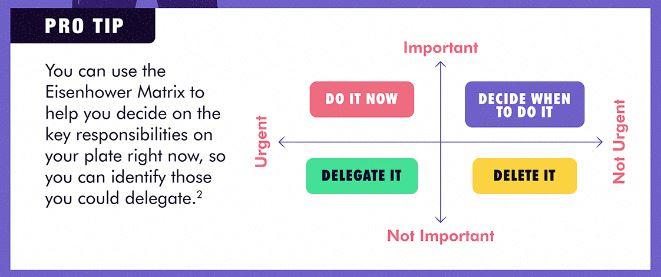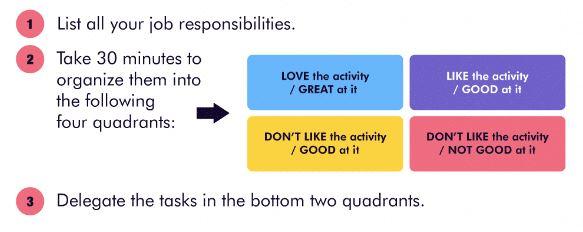share on
Try following this rule: If the other person can complete the task at least 70% as well as you can, you should delegate it to them.
As businesses grow, it is important for managers to delegate important tasks and decisions.
But delegation isn’t a simple case of just passing tasks down the chain of command. As you'd agree, delegation is a critical leadership skill, that requires analysis of who is right for the job, and checking who has enough capacity to take on the task without feeling overwhelmed.
OnDeck collected 10 pieces of delegating advice from some global business leaders. We've summarised some of the best bits for you, and for more, check out the full infographic.
1. You can use the Eisenhower Matrix to help you decide on the key responsibilities on your plate right now, so you can identify those you could delegate.

2. Best-selling author, speaker, and CEO adviser Jim Schleckser recommends following the '70% rule of delegation', which states: If the other person can complete the task at least 70% as well as you can, you should delegate it to them."
3. To help you uncover the difference between the tasks you love and those you don't, complete the 'Delegate and Elevate'™ questionnaire:

4. Any projects you hand off should come with proper context and clear tie into the organisation's goals. Make sure to clarify the following:
- The objectives for the activity being delegated,
- The standards you expect for the work,
- The broader vision of what you are attempting to accomplish.
5. If you are delegating an ongoing responsibility, you need to hand off authority to the other person. There are four keys to doing this effectively:
- Be transparent about the process you followed when managing the responsibility, including mistakes and resources.
- Communicate the boundaries in regard to decisions they cannot make without approval or failures they must avoid.
- Remove yourself from the process to allow room for the person to make mistakes.
- Inform others that delegation has occurred. Everyone affected by the change must be informed.
6. Along with the freedom to perform comes the freedom to make mistakes. Have a conversation about what happens when mistakes are made and who cleans up which mistakes. Remember that:
- Some mistakes can and should be cleaned up by the person who made them.
- Other mistakes need to be cleaned up with the guidance of a supervisor.
7. Next time you feel impatient, think back to the first time you completed a task early on in your career. You probably weren't as efficient as you are now; your time management skills have improved.
8. Make sure to ask your team for any feedback that they can give you. Ask your employees if you provided clear instructions and determine if there's anything you can do to better delegate in the future.

9. Establish a clear communication channel. Set up regular check-ins where you can provide feedback, align activities with your overarching vision, and discuss potential issues that need to be solved.
10. Give credit where credit is due. The more you thank and credit those you've delegated work to, the more likely it is they will want to help you on other projects and responsibilities in the future.
All photos / OnDeck
share on
Follow us on Telegram and on Instagram @humanresourcesonline for all the latest HR and manpower news from around the region!
Related topics


